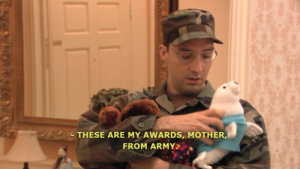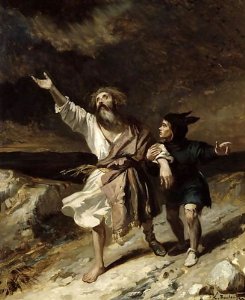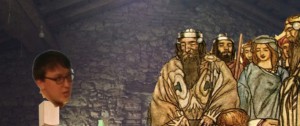You may be wondering why this site is called ‘The Head of Donn Bó’. Well, I don’t have to explain myself to you. However, I will. It comes from the tale known as Cath Almaine, The Battle of Allen, which is written in Old Irish.
Once upon a time there was great warfare between the north and the south of Ireland. Plus ça change. The king in the north was trying to gather his army but no one would come to him until he had Donn Bó in the host. Donn Bó was awesome. He was the best man in Ireland for plaiting hair, training horses and setting spears. He was the best looking man in Ireland as well. But more than this he was the best at telling stories, both tales of kings and hilarious jokes. (I know, this reminded me of me too.) However Donn Bó’s mother is very protective of him since her husband died and he has never left her house since then. Fergal, the king of the north gives her all sorts of guarantees that her son will be safe and so he gets his army.

The army of the north is led astray, taking a rambling and difficult route south to Leinster. They finally make camp in Allen beside a church. A poor leper lives nearby and sadly for him the army decide to steal his only cow. Not only that but they stab the leper with a spear. The dying leper stumbles to Fergal’s tent and curses all the men there. All except Cú Bretan who gets up to help the dying leper. This’ll become relevant later on.
With a long day’s march behind them and a dead leper in front of them Fergal decides that everyone could do with a bit of a distraction. So he turns to Donn Bó, the best story-teller in Ireland, and asks him to entertain them. The muse is not with Donn Bó that evening, however, but he promises to tell Fergal whatever story he wants the next evening, wherever he may be. In Donn Bó’s stead Hua Maiglinni, the chief buffoon of Ireland, entertains the host. He tells them all stories of the great victories of the southern Irish and the Leinstermen – foreboding! These tales put such fear into the northern Irish that they could not sleep. The massive storm that also struck that night didn’t help.

Battle is joined the next day in Duncannon. The slaughter was great, of kings and princes, lords and nobles. The bloody-mouthed goddess of death rejoiced over the number of the slain that day. Even the supernatural powers were on the Leinstermen’s side. St Colm Cille abandoned the northerners when he saw St Brigit floating over the host from Leinster. Hua Maiglinni, the royal fool, was captured. He gave a great “fool’s shout”. It was so loud that it echoed all around Ireland. Even when his throat was slit, the cry still remained in the air for three days and nights. Aed Laighen was killed while his sons were carrying his wounded body off on a litter made of their spears. Donn Bó himself was slain defending king Fergal, who was slain not long after. All the nobles who accompanied Fergal were killed. All except Cú Bretan because of the care he showed to the leper.
At the Leinster victory feast Murchad son of Bran stood up and said that he would give 21 cows to anyone who would go and fetch a man’s head from the battlefield. Baethgalach said he would go out. He strode over the bodies until he came to the place where Fergal lay. All at once a voice cried out from heaven “The Kingdom of Heaven commands you to make music and tell stories for your lord, king Fergal. Although every poet has been killed and every story-teller lies dead here, do not fear to make music tonight!”. Then Baethgalach heard the most beautiful music he had ever heard coming from heaven and the most beautiful singing and poetry coming from behind a clump of rushes.

He approached the reeds but was stopped by a voice.
“Don’t come any closer!”
“What? Who said that?” said the warrior.
“I am Donn Bó,” said the voice. “I vowed to make music and tell tales to my lord, Fergal, tonight. I will not perform any task for Murchad, so go away!”
“Where is Fergal?” asked Baethgalach.
“His is the shining body, lying just over there”, said the head of Donn Bó.
“I have to take a head from the battlefield tonight. I would prefer to take yours but if not whose should I take?”
“If it pleases Christ, you can take my head. But if you do, be sure to return me to my body after.”
So Baethgalach returned to celebrating Leinstermen with the head of Donn Bó. They all recognised the beautiful story teller and bemoaned his death. Baethgalach put the head on a pillar in the corner of the hall and asked him, in the name of Jesus, to entertain the Leinstermen as he had entertained his former lord. He does so despite his earlier protests because ¯\_(ツ)_/¯. The head turns itself to the wall and begins singing a melody sweeter than any before heard on earth. The celebrating hosts of Leinster are moved to weeping and wailing at the piteousness of the song.

On the next day Baethgalach returned the head to its body, as he had promised. Through the miracle of Colm Cille the head stuck on its body and Donn Bó was returned to life. He was able to return to his mother safe and sound as the only other survivor of the battle of Allen.
Fergal’s head was taken away to be buried in the west, but that is the beginning of a whole other thing and I’m not getting into that.
An old edition and translation of Cath Almaine can be found here. There is a more modern edition here, but this is only the Irish.
Obviously heads are very important in this tale, what with all the decapitations. As is the semi-magical power of poetry – it can deeply effect the emotions of all who hear it and its obligations can extend beyond the grave. This tale leans quite heavily on dramatic foreshadowing and the disastrous nature of the battle is repeatedly emphasised. There is a long list of the dead which I missed out here.
However, the disembodied head on a pole is a good image for me to use to tell tales, not just of the Leinstermen but of all medieval Ireland, to the celebrating hosts of the internet.

This is great! Thank you. I love the Irish epics. If I could ask only one small favor, could you add pronounciations to some of these names? I mean Bo is pretty straightforward but I’m sure that’s not Beth Galack. 🙂
LikeLike
Thanks! I will try and put an pronunciation guide into future posts. As it is here the accent on the ‘o’ means that is long (the ‘o’ in ‘coat’, not the ‘o’ in ‘cot’). Baethgalach can be very roughly rendered ‘boyth-gall-ach’. The last ‘ch’ should be pronounced like the ‘ch’ in a Scottish ‘loch’.
I’ll be better at this for next week.
LikeLike
I’m just lazy 🙂 I do have pronunciation guides. Although I probably would have said “Bayth”
LikeLike
That’s pretty much it if the ‘ay’ is as in ‘eye’ rather than the ‘ay’ in ‘bay’. Hope this helps.
LikeLike